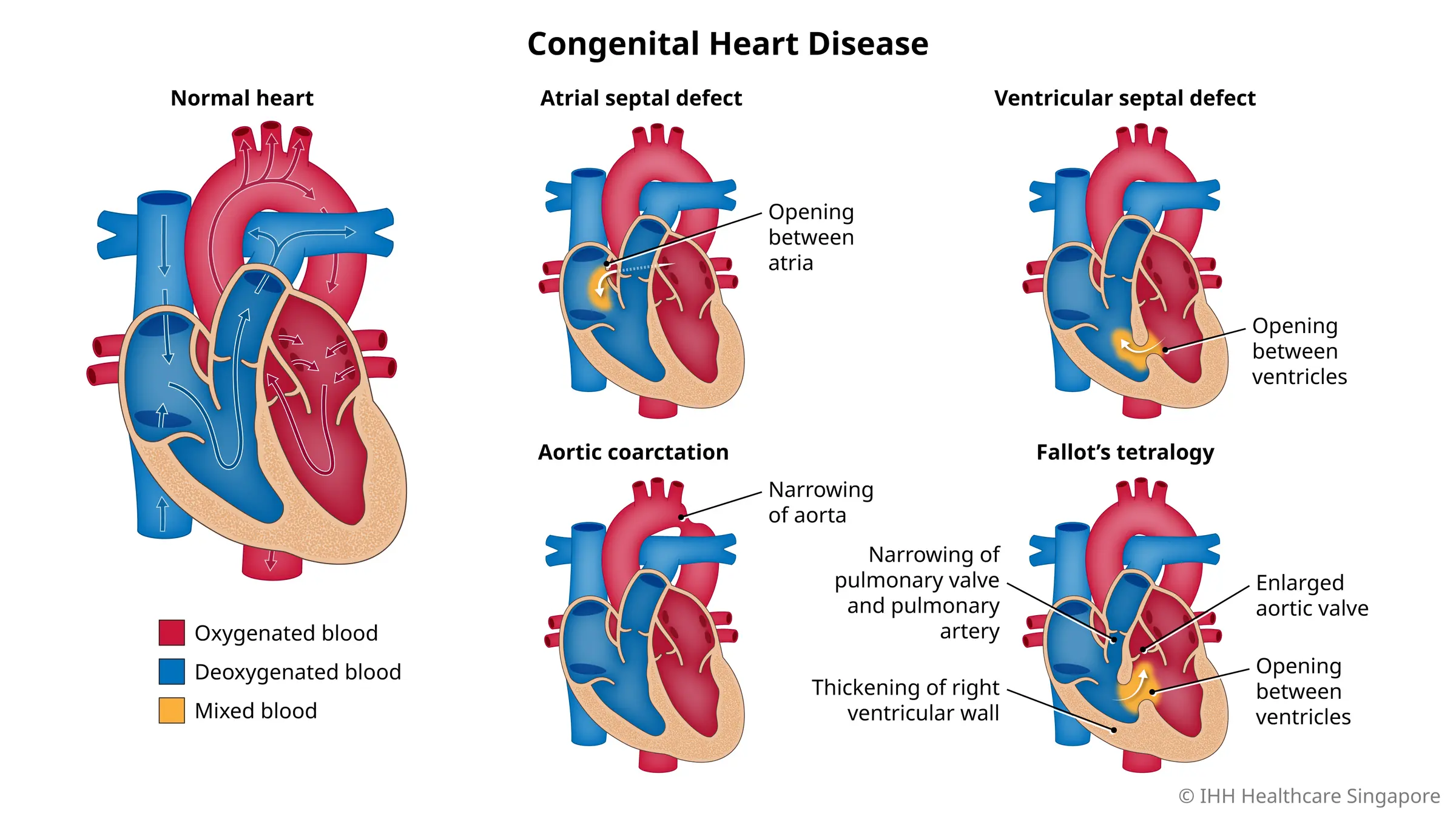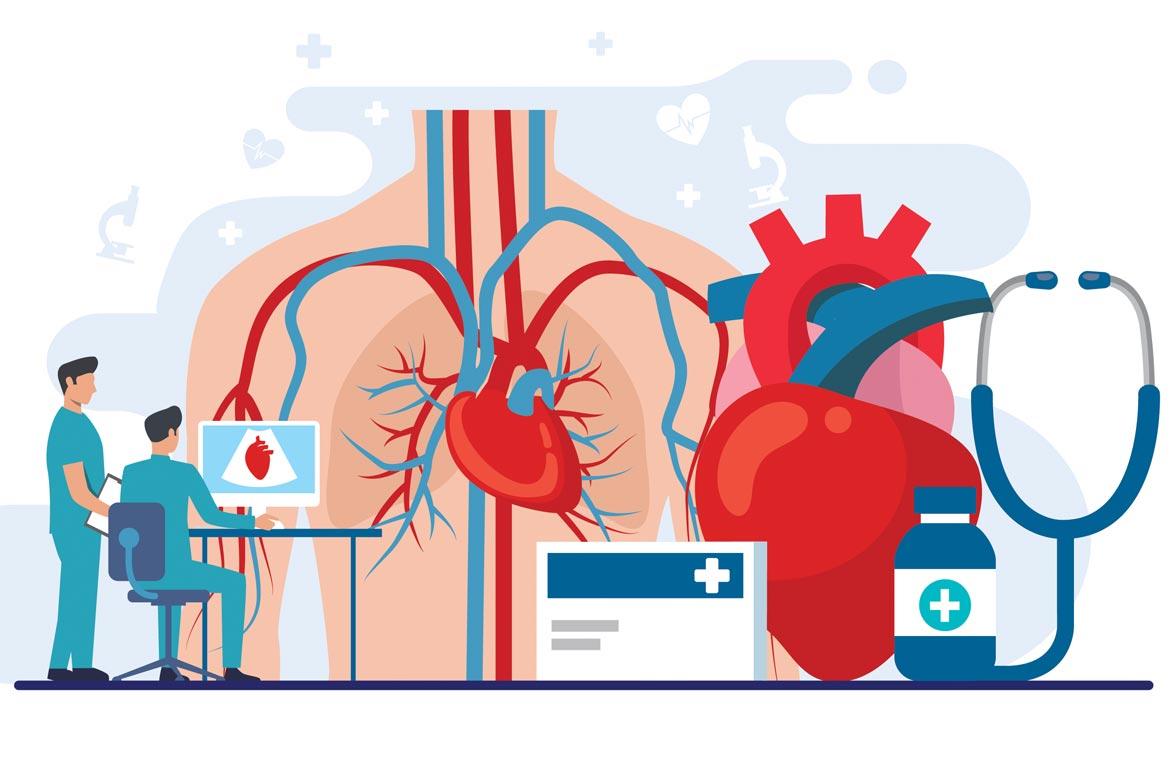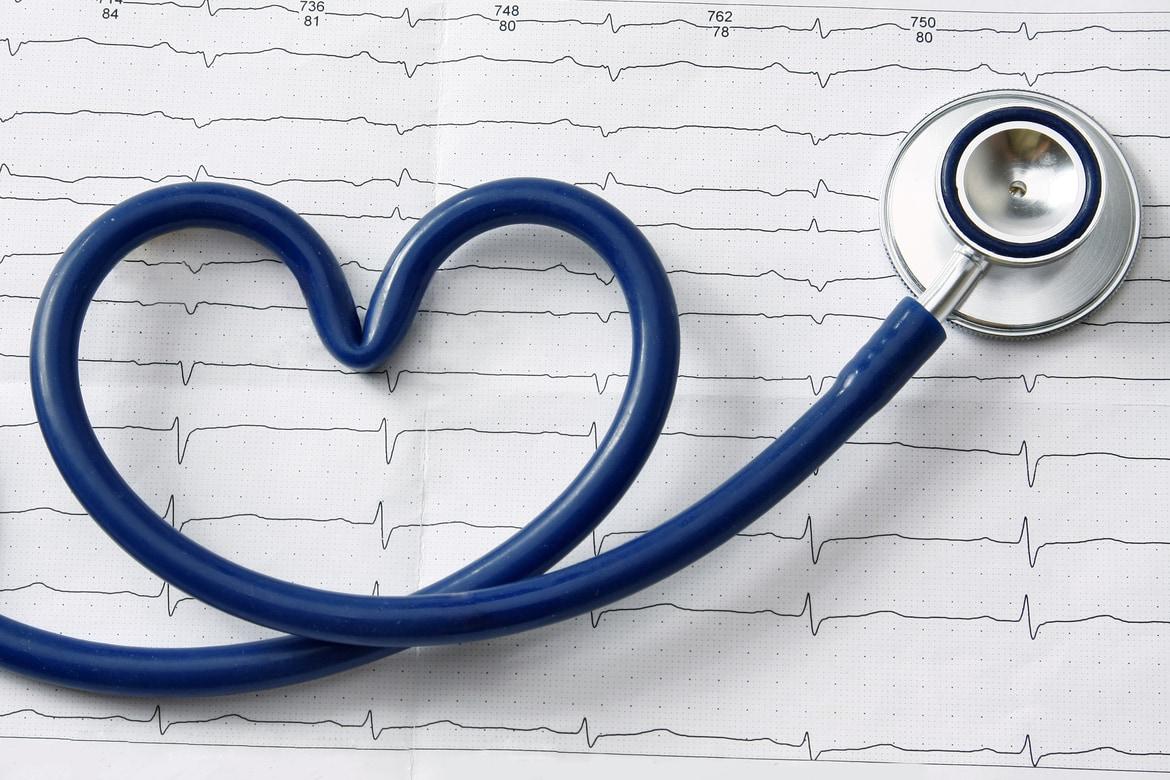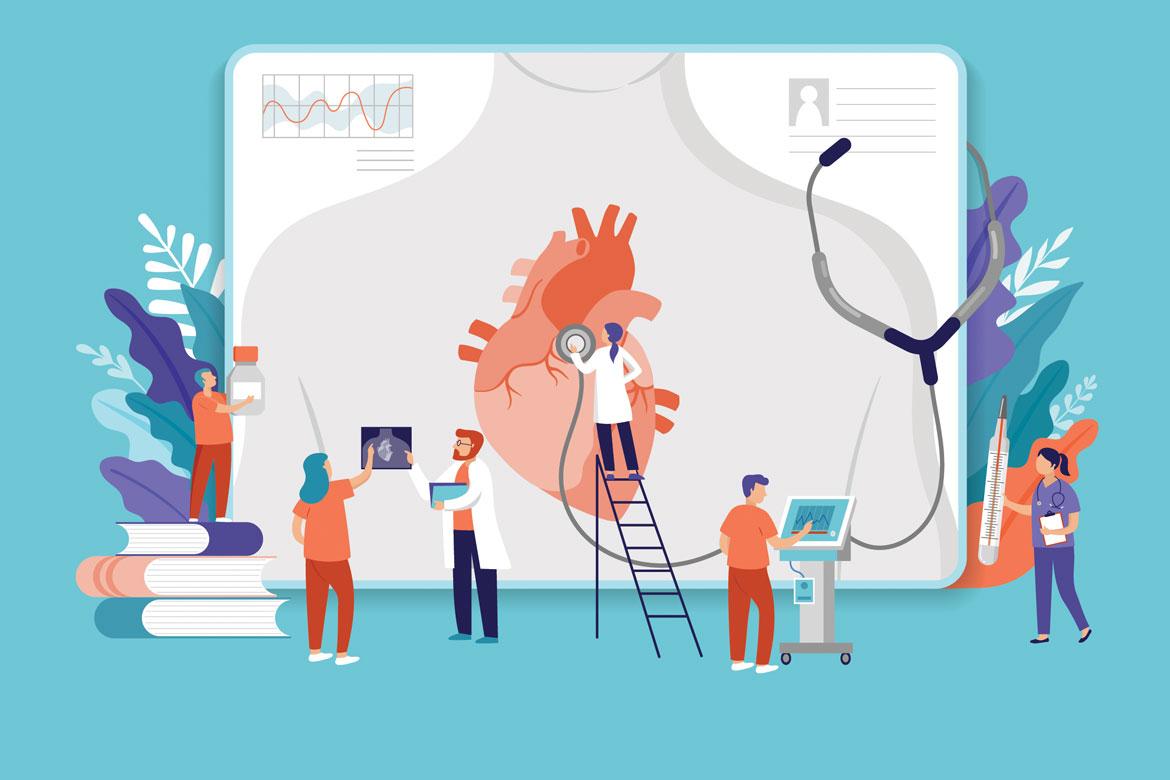Congenital Heart Disease
What is congenital heart disease (CHD)?
Congenital heart disease (CHD) refers to heart defects that are present at birth.
These defects affect the structure and function of the heart.
They range in severity. Mild defects include conditions such as a small hole in the heart, and severe and life-threatening ones may involve missing structures. These defects can affect how blood flows through the heart and to the rest of the body.
According to Singapore's birth defect registry, congenital heart disease was a factor in 0.81% of total live births from 1994 – 2000.
Nationwide, there are about 12,000 adults living with congenital heart disease. With an average of 37,000 – 40,000 babies born each year, it is estimated that the number of adult cases will increase by 300 – 320 every year.
Types of congenital heart disease
There are many types of congenital heart diseases.
Atrial septal defect
In this condition, there is a hole in the wall separating the two upper chambers of the heart, which can lead to damage in the blood vessels in the lungs. If the hole does not close on its own, surgery may be required.
Left untreated, it can cause problems in adulthood such as high blood pressure in the lungs, abnormal heartbeat, increased risk of stroke and heart failure.
Ventricular septal defect
This refers to a hole in the heart between the wall (septum) that separates the lower chambers of the heart (ventricles).
This hole redirects oxygen-rich blood from the left to the right side of the heart, sending it back to the lungs instead of distributing it to the rest of the body.
Coarctation of the aorta
In this condition, part of the aorta is narrower than usual because it did not develop normally during pregnancy.
This is a critical congenital heart defect; if the narrowing is severe, the surgery may be necessary soon after birth.
Fallot's tetralogy or tetralogy of Fallot
This comprises of 4 defects in the heart and its blood vessels:
- A hole in the wall between the two lower chambers or ventricles (a condition known as a ventricular septal defect)
- Narrowing of the pulmonary valve and main pulmonary artery (known as pulmonary or aortic stenosis)
- An enlarged aortic valve with both ventricles opening into it
- Thicker than normal muscular wall of the right ventricle (also known as ventricular hypertrophy)
Patent ductus arteriosus
At birth, it is normal for there to be an opening between the two major vessels leading from the heart. This usually closes on its own after birth. Patent ductus arteriosus (PDA) is diagnosed when this does not happen.
A small opening may not require treatment but large openings allow poorly oxygenated blood to flow in the wrong direction. This weakens the heart muscle and can lead to complications and heart failure.
Pulmonary atresia
In this condition, blood is unable to flow from the right ventricle of the heart to the lungs, because the pulmonary valve is missing. This is a critical congenital heart defect that may require surgery soon after birth.
Pulmonary or aortic stenosis
This is the narrowing of the pulmonary valve and main pulmonary artery. It is one of the four defects categorised under tetralogy of Fallot.
Transposition of the great arteries
In this rare defect, the two main arteries leaving the heart are reversed. This changes the way blood circulates through the body and results in low oxygen blood being pumped to the body. This is a critical congenital heart defect.
What are the symptoms of congenital heart disease?
Many congenital heart defects do not result in clear symptoms.
However, serious or multiple congenital heart defects can cause symptoms such as:
- Blue skin, lips and fingernails
- Chest pain
- Fainting
- Heart murmur
- Palpitation (fast, strong or irregular heartbeats)
- Poor blood circulation
- Rapid breathing
- Tiredness
- Failure to thrive (grow) in newborns or infants
These symptoms depend on the type and severity of CHD.
What causes congenital heart disease?
The causes for congenital heart diseases are mostly unknown.
Several risk factors have been linked to the development of congenital heart disease and they include chromosomal abnormalities, genetic defects and environmental factors.
Genetic and chromosomal conditions include:
- Down syndrome, which increases incidence of CHD by 50%.
- DiGeorge syndrome, where a missing part of chromosome 22 is associated with many medical problems, including heart defects.
- Marfan syndrome, caused by an abnormal gene that affects the connective tissues in the body and can lead to many health problems including heart problems such as mitral valve prolapse.
- Turner syndrome, which is a chromosomal abnormality caused by the absence of the second X chromosome. It can affect any organ, including the heart.
What are the risk factors for congenital heart disease?
Environmental factors and exposure to certain substances in the early weeks of pregnancy when the baby’s heart is forming can increase the risk of the baby developing a congenital heart disease.
Environmental risk factors include:
- Excessive drug or alcohol consumption during pregnancy.
- Certain medications, such as isotretinoin (used to treat acne) or lithium (used to treat depression or bipolar disorder).
- Exposure to chemicals such as arsenic, cadmium and organic solvents.
- Viral infections such as rubella, whicj leads to a very high chance of having a baby with congenital heart disease.
- Diabetes, especially uncontrolled diabetes.
- Smoking during pregnancy increases the risk of pregnancy complications, birth defects, and miscarriage.
What are the complications of congenital heart disease?
Congenital heart diseases can lead to life-long complications and related conditions.
These include an increased risk of:
- Heart failure and stroke.
- Complications related to pregnancies, use of contraception and risk of cardiac disease in offspring.
- Swelling of the inner layers of the heart, known as endocarditis. This is an infection of the inner lining of the heart chambers and valves. Left untreated, it can damage the heart valves and lead to serious complications.
- Cardiovascular diseases such as irregular heartbeat (arrhythmias), pulmonary hypertension, stroke and heart failure.
- Non-cardiac medical problems.
- Social, emotional, financial, employment and educational issues.
- Surgical procedure complication and life-long follow-up.
How do you prevent congenital heart disease?
There is no guaranteed way to prevent the development of congenital heart diseases.
However, pregnant woman can reduce the risk by avoiding known risk factors and taking some precautions:
- Get vaccinated against rubella and influenza.
- Avoid drinking alcohol.
- Do not smoke.
- Speak to your doctor before taking any medications, supplements or herbal remedies.
- Take 400mg folic acid per day during the first trimester to help prevent birth defects.
- Avoid contact with people who are unwell.
- If you have diabetes, ensure it is well-controlled.
- Avoid exposure to chemicals such as organic solvents, which are commonly found in dry-cleaning, paint thinner and nail polish remover.











